Chad Richison, the Founder and CEO of Paycom—the leading tech company in cloud-based payroll and human resources software— is always seeking opportunities to modernize the industry. So often, employers and employees have to deal with outdated practices when it comes to payroll and H.R. Chad has noticed that younger generations unbanking by choice and turning to pay cards are becoming more prevalent.
Now, Paycom has seized on this trend, launching its newest innovation: the Vault Visa® Payroll Card.
What is the Vault Visa Payroll Card?
Vault is a physical and digital card for their mobile wallet exclusively available to Paycom customers, giving them more control over their funds. It allows them to access electronic deposits as well as 40,000 no-fee Allpoint ATMs here in the U.S. and Puerto Rico. This service is available at common retailing stores such as Walgreens and CVS. Employees can also use Vault as a separate account for shopping, entertainment, and vacation expenses.
What Are The Benefits?
Employees using Vault can get paid up to two days earlier each payroll cycle. This option comes in handy for households during these high inflation times. Employees can also save money since the card eliminates the need to use paper checks, which usually charge a fee when cashing.
Other advantages for employees who use the Vault card include:
- Access to several exclusive offers and benefits, including discounts on hotels, subscriptions, restaurants, stores, and services.
- The card offers fraud protection.
- Easy enrollment through Paycom’s Employee Self-Service.
- Convenient access to funds anywhere Visa debit cards are accepted.
Chad recently spoke at the Credit Suisse Technology Conference about Vault:
Vault gives the ability for an employee to actually put money on a card versus in an account. I’d like to think that people in mine and Craig’s generation, if we’re unbanked, it’s because someone wouldn’t bank us. Some of your younger generations unbank by choice, and so these types of pay cards have become more and more prevalently used by people.
You even have people that have a bank account, and they have a certain pay card. And so, as we look in our system, we can tell which employees actually use pay cards. And up to now, none of them have been our pay cards. So a pay card is an opportunity. Vault, being that for us, is an opportunity for us to be able to provide this ourselves to the employee, those that want it. And then we get to share in revenue from the interchange rates charged through the merchant vendor, so we get to share in that.
Chad also elaborated on earned wages and early pay as it relates to Vault:
We’re separating the two. One is everyday pay, or being able to be paid every day; Vault’s more the method in which you would receive that payment. In answer to the everyday pay, I’ve always stood consistent with the thought that if you’re paying an employee, you need to deposit and file their taxes.
Oftentimes, you get to the end of the pay period, and maybe you allow the employee to take more than what you were able to deduct because someone still has to pay their health insurance, they still have to pay for the taxes and what have you.
What Are The Benefits for Employers?
Vault is advantageous to employers, too, such as decreasing check fraud through secure electronic funding, eliminates paper-based payments and boosts benefits to counteract the labor market’s volatility. In the same vein, Vault gives employers a chance to attract and retain staff due to the appealing payment options. According to Chad, retaining talent is a prevalent challenge in today’s workforce, and he believes Vault is a benefit employees will be excited to have.
Chad Richison also offered that this latest solution from Paycom will complement Beti™, Paycom’s lauded online payroll tool. Before submitting a payroll, Beti helps employees identify and correct any problems. By fixing mistakes in the user-friendly Paycom software, Beti guarantees an accurate payroll and minimizes administration-related issues.
The Vault Visa Card is another significant step in empowering employees and improving how companies do payroll.


